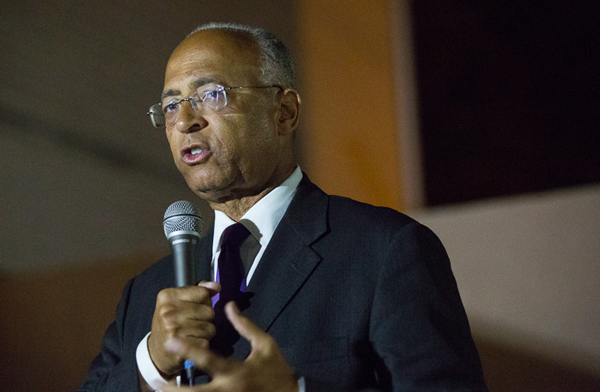
Photo by: Karla Ann Cote
While Bill de Blasio, Christine Quinn and Anthony Weiner raised money for a possible runoff, Bill Thompson did not.
Pressure is mounting (does pressure ever do anything else?) on Bill Thompson to end his campaign for mayor, with Democratic stalwarts, black leaders, unions and others calling on the former comptroller to abandon his bid so the city can avoid a runoff and rally around Bill de Blasio.
Runoffs sure have gotten themselves a bad name. In 2001, the runoff race between Fernando Ferrer and Mark Green took on an ugly racial dimension, fracturing Democrats enough to allow Republican Mike Bloomberg to win. In 2009, there were runoffs for comptroller and public advocate in which 241,000 people voted—about 8 percent of registered Democrats.
Even if Thompson waves a white flag, there will still be a runoff election this year: Councilwoman Letitia James and State Senator Daniel Squadron will face off in a second round for public advocate—the third runoff for that office in the past four election cycles. Estimates are that a runoff will cost $13 million or more.
And it was the very prospect of a runoff that had the city pushing this year to move the primary to June; when that didn’t happen, the state legislature authorized the Great Lever Machine Comeback because the multimillion-dollar electronic voting machines the city bought couldn’t be reprogrammed in time for a runoff. State lawmakers also pushed the runoff back a week, truncating the general election campaign.
We’ve teetered on the precipice of a mayoral runoff before. In 1997, it looked for days like primary winner Ruth Messinger was going to have to face Rev. Al Sharpton in a runoff, but then the Board of Elections found uncounted ballots and reported that, in fact, Messinger had cleared the 40 percent threshold; Sharpton sued to overturn the board, but failed to convince a judge.
Eight years ago, Ferrer again won the Democratic primary, but on election night it appeared that he’d fallen just short of 40 percent, with Anthony Weiner finishing second. The next morning, Weiner took himself out of the race in the name of party unity (and good strategy). As it turned out, Ferrer did get enough votes to avoid the runoff anyway, with 40.15 percent of the primary vote.
But what was really interesting in ’05 was a question some posed after Weiner’s surrender: Did he have the right to call off a runoff? Wasn’t that up to the voters?
The legislature imposed runoffs on New York City after the 1969 race, when Mario Procaccino won the Democratic primary with barely a third of the vote, then went on to lose to Republican John Lindsay. The logic behind a runoff is that, given the crowded field that primaries attract, it’s possible for someone to win with only a small plurality, making the result a poor reflection of the public’s will. In the 1977 Democratic primary, for instance, Ed Koch won less than 20 percent of the vote but led the primary results. He ended up winning a runoff that demonstrated that he was actually preferable to a majority of voters.
People have been calling for years to get rid of runoffs. Runoffs were the target of a 1985 lawsuit arguing that they hurt minority voters; a federal appeals court disagreed. Recently there’s been interest in instituting “instant runoff voting,” in which voters would pick a second-choice candidate on Election Day to be used if no one hit 40 percent. In 2010, the city’s Charter Revision Commission contemplated implementing instant runoff voting, but determined that “such a sweeping change needed further analysis.”
In the present case, some 19,000 ballots remain to be counted, including affidavit ballots that many of us (including yours truly) had to complete because our names were not on the voter list. Polling site workers told people filling out the paper forms—explicitly—that their votes would be counted. Keep in mind that Thompson doesn’t have to gain a single vote out of those 19,000 to force a runoff—all that matters is whether de Blasio maintains 40 percent or more of the total vote, which requires him to get 7600 or so of the remaining votes.
One question no one seems to have addressed is, what happens if Thompson bows out, and the tally shows de Blasio fell short? Seems like that’d be a pretty good talking point for Joe Lhota.
Runoff fundraisingOnly three candidates raised money for the runoff—and two of them are certainly not going to need it. On Thursday, the Campaign Finance Board announced matching fund payments for the public advocate runoff race.Squadron received $511,720 and James $230,612.







